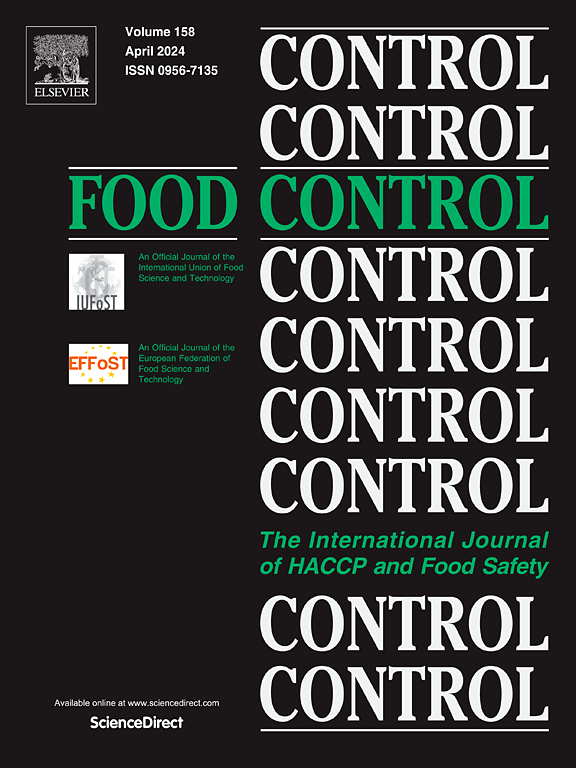A pangenome-informed portable qPCR microchip assay for detecting stress-resistant Listeria monocytogenes (LM-ResiChip)
IF 5.6
1区 农林科学
Q1 FOOD SCIENCE & TECHNOLOGY
引用次数: 0
Abstract
Stress-resistant Listeria monocytogenes present serious food safety challenges due to their ability to survive under refrigeration, acidic pH, and high salinity. To enable rapid on-site detection, we developed LM-ResiChip, a portable, microfluidic chip-based qPCR assay targeting stress-resistance-associated genes in L. monocytogenes. Using comparative pangenome analysis of 38 L. monocytogenes genomes, we identified four molecular markers, dasC, malL, gtfA, and thiE, consistently present in resistant strains and functionally linked to salt, oxidative, and nutrient stress adaptation. The assay was implemented on a compact qPCR system with a 3D polymer-based chip, allowing simultaneous duplex detection of all four target genes in a single run. The LM-ResiChip demonstrated high specificity, amplifying only stress-resistant L. monocytogenes (n = 32) and showing no cross-reactivity with stress-sensitive strains or other Listeria species (n = 19). It achieved sensitive detection down to 101 CFU/mL in both pure culture and enoki mushroom samples. All genes exhibited strong linearity (R2 > 0.994) and amplification efficiencies of 90–96 %, confirming robust performance even in complex food matrix. This field-deployable, cost-effective system offers a powerful solution for real-time detection of stress-resistant L. monocytogenes, enhancing proactive food safety monitoring and risk mitigation in processing environments.
基于泛基因组的便携式qPCR芯片检测抗逆性单核增生李斯特菌(LM-ResiChip)
抗逆性单核细胞增生李斯特菌由于其在冷藏、酸性pH和高盐度条件下的生存能力,给食品安全带来了严峻的挑战。为了实现快速的现场检测,我们开发了LM-ResiChip,这是一种基于便携式微流控芯片的qPCR检测方法,针对单核增生乳杆菌的抗性相关基因。通过对38个L. monocytogenes基因组的比较全基因组分析,我们确定了4个分子标记,dasC、malL、gtfA和ie,它们在抗性菌株中一致存在,并在功能上与盐、氧化和营养胁迫适应有关。该检测是在一个紧凑的qPCR系统上实现的,该系统带有一个基于3D聚合物的芯片,允许在一次运行中同时双工检测所有四个目标基因。LM-ResiChip显示出高特异性,仅扩增抗应激的单核增生李斯特菌(n = 32),与应激敏感菌株或其他李斯特菌(n = 19)无交叉反应性。该方法对纯培养菌和针叶菌样品的检测灵敏度均达到101 CFU/mL。所有基因均表现出较强的线性关系(R2 >;0.994),扩增效率90 ~ 96%,即使在复杂的食品基质中也具有良好的性能。这种可现场部署的、具有成本效益的系统为实时检测抗逆性单增李斯特菌提供了强大的解决方案,增强了加工环境中的主动食品安全监测和风险缓解。
本文章由计算机程序翻译,如有差异,请以英文原文为准。
求助全文
约1分钟内获得全文
求助全文
来源期刊

Food Control
工程技术-食品科技
CiteScore
12.20
自引率
6.70%
发文量
758
审稿时长
33 days
期刊介绍:
Food Control is an international journal that provides essential information for those involved in food safety and process control.
Food Control covers the below areas that relate to food process control or to food safety of human foods:
• Microbial food safety and antimicrobial systems
• Mycotoxins
• Hazard analysis, HACCP and food safety objectives
• Risk assessment, including microbial and chemical hazards
• Quality assurance
• Good manufacturing practices
• Food process systems design and control
• Food Packaging technology and materials in contact with foods
• Rapid methods of analysis and detection, including sensor technology
• Codes of practice, legislation and international harmonization
• Consumer issues
• Education, training and research needs.
The scope of Food Control is comprehensive and includes original research papers, authoritative reviews, short communications, comment articles that report on new developments in food control, and position papers.
 求助内容:
求助内容: 应助结果提醒方式:
应助结果提醒方式:


